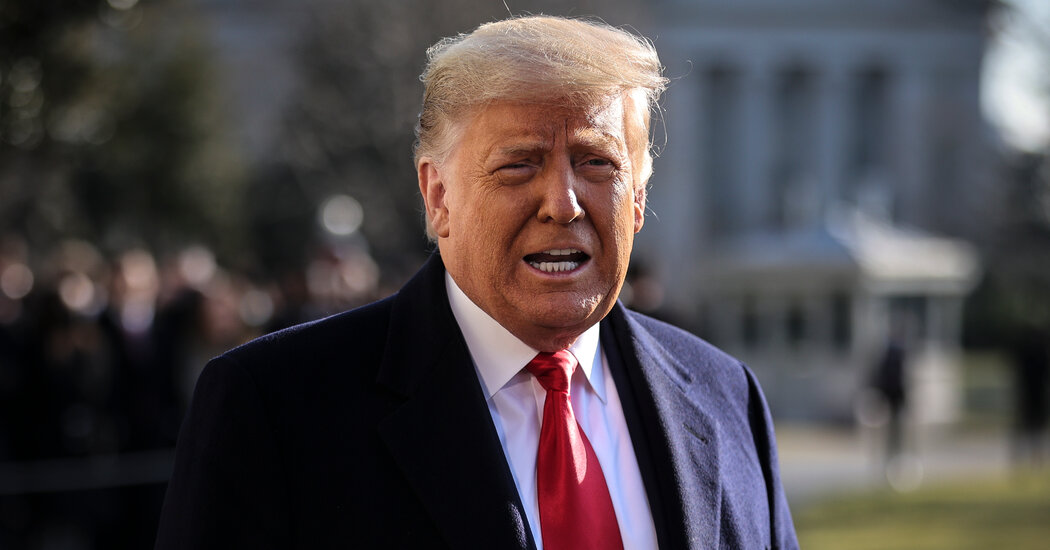Former President Donald J. Trump abruptly ended the interview after a lengthy back-and-forth over his claims of widespread election fraud.
Former President Donald J. Trump abruptly ended an interview with NPR on Tuesday after he was pressed on his false claim of a stolen election in 2020 and how he was using that assertion to put pressure on Republicans before the 2022 midterm elections.
In the interview with Steve Inskeep, a co-host of NPR’s Morning Edition, Mr. Trump discussed the coronavirus pandemic and his campaign to discredit results of the 2020 election, according to a transcript of the interview NPR posted on its website on Wednesday morning.
At several points in the interview, Mr. Inskeep pushed back against false claims about the 2020 election, in one instance noting the failed lawsuits by Mr. Trump’s campaign and its allies. “Your own lawyers had no evidence of fraud, they said in court they had no evidence of fraud, and the judges ruled against you every time on the merits,” Mr. Inskeep said.
After a lengthy back-and-forth over the election results, Mr. Trump asked how he could have lost the presidential election to Joe Biden, who he falsely claimed did not attract crowds during the campaign.
Mr. Inskeep said: “If you’ll forgive me, maybe because the election was about you. If I can just move on to ask, are you telling Republicans in 2022 that they must press your case on the past election in order to get your endorsement? Is that an absolute?”
Understand the Jan. 6 Investigation
Both the Justice Department and a House select committee are investigating the events of the Capitol riot. Here’s where they stand:
- Inside the House Inquiry: From a nondescript office building, the panel has been quietly ramping up its sprawling and elaborate investigation.
- Criminal Referrals, Explained: Can the House inquiry end in criminal charges? These are some of the issues confronting the committee.
- Garland’s Remarks: Facing pressure from Democrats, Attorney General Merrick Garland vowed that the D.O.J. would pursue its inquiry into the riot “at any level.”
- A Big Question Remains: Will the Justice Department move beyond charging the rioters themselves?
Mr. Trump responded: “They are going to do whatever they want to do — whatever they have to do, they’re going to do.”
He continued to speak about his false claim that the 2020 election was “rigged” while Mr. Inskeep tried to interject.
Mr. Trump then abruptly ended the interview.
“So Steve, thank you very much,” he said. “I appreciate it.”
“Whoa, whoa, whoa, I have one more question,” said Mr. Inskeep, who began to ask about a court hearing on Monday related to the Capitol riot by a pro-Trump mob last year. He then stopped himself, saying, “He’s gone. OK.”
At the Monday hearing in the U.S. District Court for Washington, lawyers argued that Mr. Trump, by inspiring the riot, was liable for major financial damages.
It was not clear how much of the question Mr. Trump heard before ending the interview.
Early in the interview, Mr. Inskeep asked Mr. Trump about the coronavirus pandemic and what the former president would tell people who have not been vaccinated. Mr. Trump, who said in December that he had received a Covid-19 vaccine booster shot, told Mr. Inskeep that he recommended that people take the vaccine but that he did not support vaccine mandates.
Key Figures in the Jan. 6 Inquiry
The House investigation. A select committee is scrutinizing the causes of the Jan. 6 riot at the U.S. Capitol, which occurred as Congress met to formalize Joe Biden’s election victory amid various efforts to overturn the results. Here are some people being examined by the panel:
Mr. Inskeep then asked how useful it was for Republicans to talk about the 2020 election before this year’s midterms, noting that Senator Mike Rounds, a Republican from South Dakota, told ABC over the weekend that the presidential election was not rigged.
“No, I think it’s an advantage, because otherwise they’re going to do it again in ’22 and ’24,” Mr. Trump said. “And Rounds is wrong on that, totally wrong.”
Mr. Inskeep then raised several instances in which Mr. Trump’s allies and election officials disputed his false claims of widespread election fraud. Mr. Trump repeated his claim and criticized Senator Mitch McConnell, a Republican from Kentucky and the minority leader.
The abrupt end of the interview recalled an episode in October 2020 when Mr. Trump, then the president, cut off an interview with “60 Minutes” at the White House and then taunted the interviewer, Lesley Stahl, on Twitter. Twitter permanently barred Mr. Trump from its site in the aftermath of the Capitol riot, saying it made the decision “due to the risk of further incitement of violence.”
According to the transcript, Mr. Inskeep started the interview by telling Mr. Trump that he had first invited him to talk in 2015. Mr. Inskeep also explained that the interview was being prerecorded and that it should take about 15 minutes. “Very good,” Mr. Trump responded.
The interview lasted nine minutes, according to NPR.


























